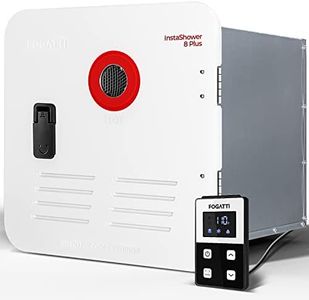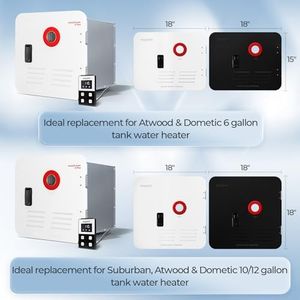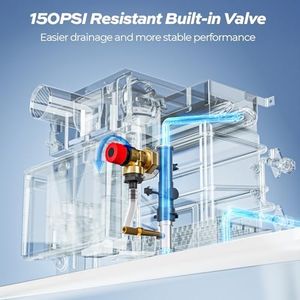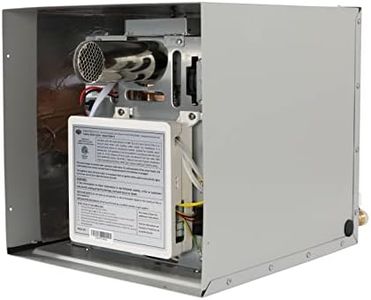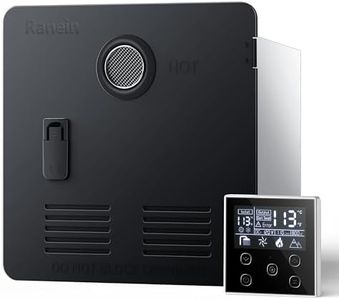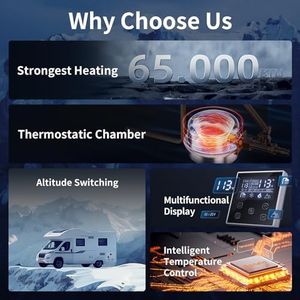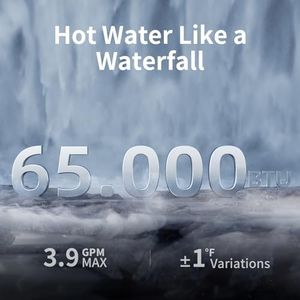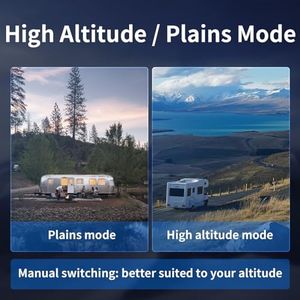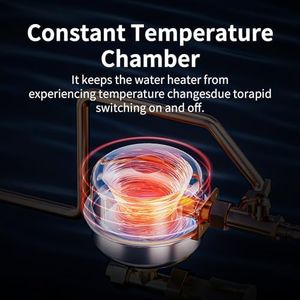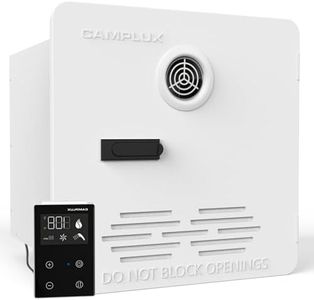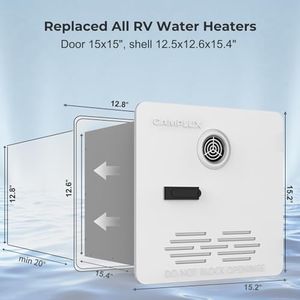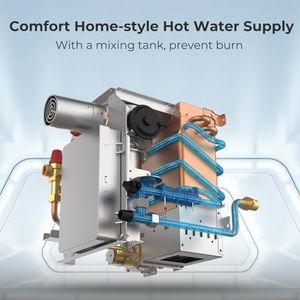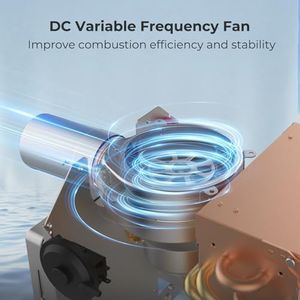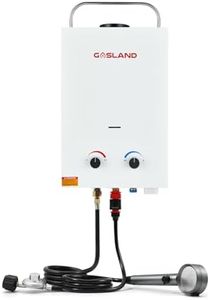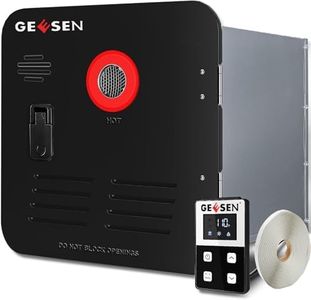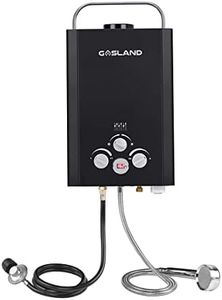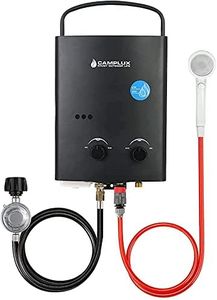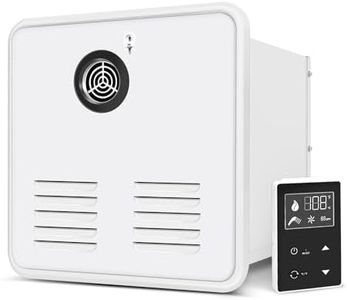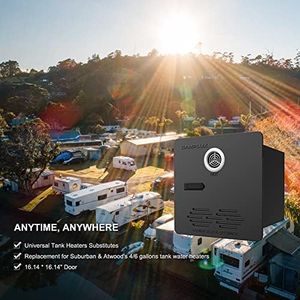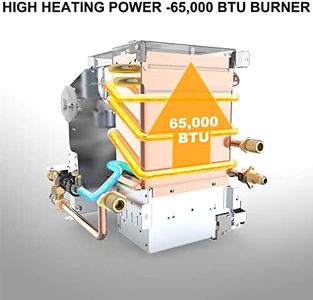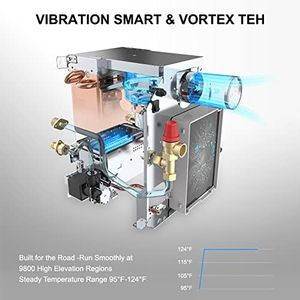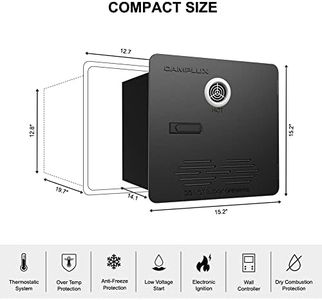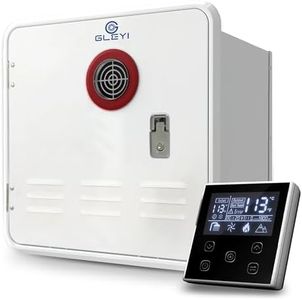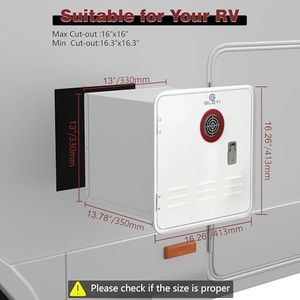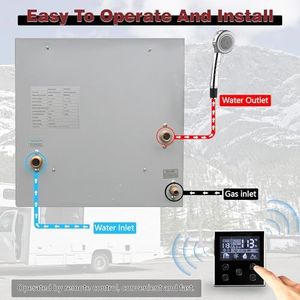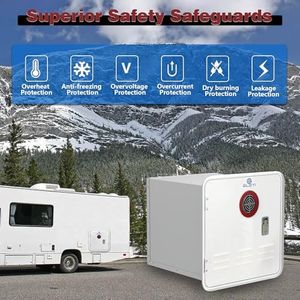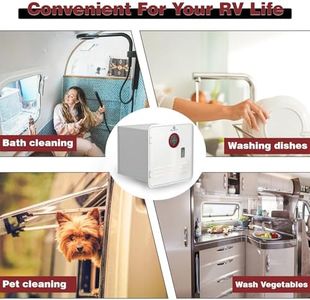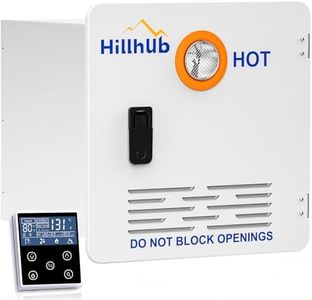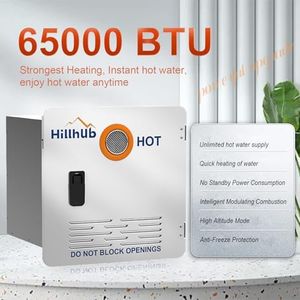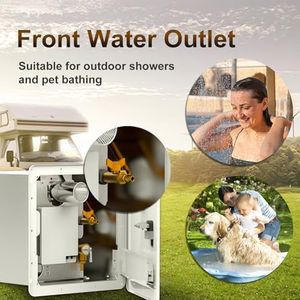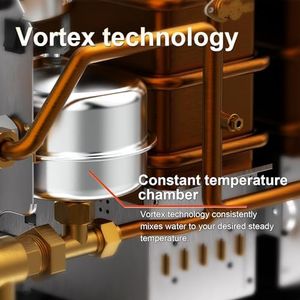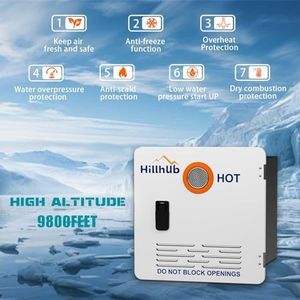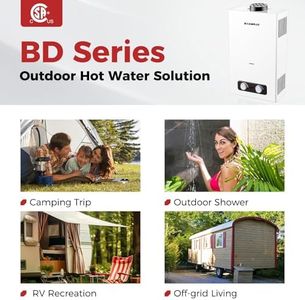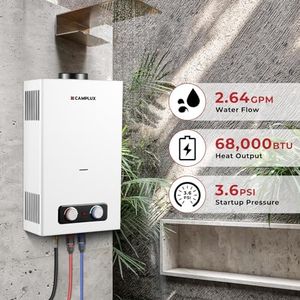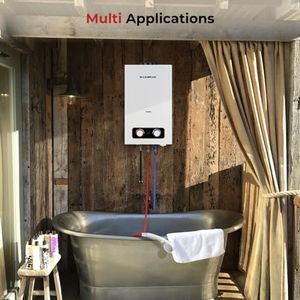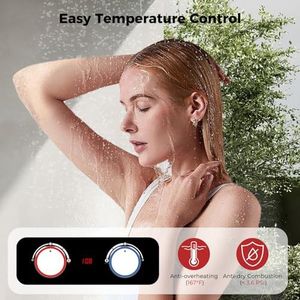We Use CookiesWe use cookies to enhance the security, performance,
functionality and for analytical and promotional activities. By continuing to browse this site you
are agreeing to our privacy policy
10 Best Rv Tankless Water Heaters
From leading brands and best sellers available on the web.By clicking on a link to a third party's website, log data is shared with that third party.
Top 10 Best Rv Tankless Water Heaters 2026 in Canada
#1
Winner
FOGATTI RV Tankless Water Heater, InstaShower 8 Plus, Gen 2, with 15 x 15 inches White Door and Remote Controller, DC 12V, Best High Altitude Performance, Ideal for RVers' Everyday Use
FOGATTI RV Tankless Water Heater, InstaShower 8 Plus, Gen 2, with 15 x 15 inches White Door and Remote Controller, DC 12V, Best High Altitude Performance, Ideal for RVers' Everyday Use
Flow Rate (Gallons Per Minute, GPM): 2.9 gallons per minute
Fuel Type (Propane, Electric, or Hybrid): Propane
Size and Installation Requirements: 38.1 cm; 15 inch door
Temperature Control and Stability: Max 123°F; remote controller
Cold Weather Performance: Anti-freezing; works at 9,800 feet
Chosen by 1205 this week
Girard 2GWHAM On-Demand Tankless Water Heater
Girard 2GWHAM On-Demand Tankless Water Heater
Fuel Type (Propane, Electric, or Hybrid): Propane
Size and Installation Requirements: Moderately compact; needs professional installation
Temperature Control and Stability: Adjustable 95-124°F; digital control panel
Cold Weather Performance: Extra cold weather protection needed
Ranein 65,000 BTU RV Tankless Water Heater, High Altitude Available, 12V, CSA Certificated, with Black Door and Multi-function Controller, On Demand Instant Hot Water Heater, Compatible with all RVs
Ranein 65,000 BTU RV Tankless Water Heater, High Altitude Available, 12V, CSA Certificated, with Black Door and Multi-function Controller, On Demand Instant Hot Water Heater, Compatible with all RVs
Flow Rate (Gallons Per Minute, GPM): 3.9
Fuel Type (Propane, Electric, or Hybrid): Propane
Size and Installation Requirements: Fits standard RV cutouts 12.8” x 12.8”
Temperature Control and Stability: 95°F to 124°F, staged combustion
Cold Weather Performance: Anti-freeze activates below 42.8°F
CAMPLUX 65,000 BTU RV Water Heater, 2.64 GPM RV Tankless Hot Water Heaters with 15.2×15.2 Inches Door and Remote Controller, Propane Tankless RV Water Heater with Mixing Tank DC12V/5A
CAMPLUX 65,000 BTU RV Water Heater, 2.64 GPM RV Tankless Hot Water Heaters with 15.2×15.2 Inches Door and Remote Controller, Propane Tankless RV Water Heater with Mixing Tank DC12V/5A
Flow Rate (Gallons Per Minute, GPM): 2.64 Gallons Per Minute
Fuel Type (Propane, Electric, or Hybrid): Liquid Propane
Size and Installation Requirements: 32x39x32 cm; Wall-Mounted
Temperature Control and Stability: ±1°F with mixing tank
Minimum Activation Flow Rate: 0.5 GPM
Cold Weather Performance: Good; may need extra insulation
Furrion® RV Tankless Gas 60,000 BTU Water Heater - 16.14" x 16.14" White Door - 2.4 GPM – Vortex Technology steadies temperatures – Propane Gas-Powered Technology, Electric Ignition – 2021128847
Furrion® RV Tankless Gas 60,000 BTU Water Heater - 16.14" x 16.14" White Door - 2.4 GPM – Vortex Technology steadies temperatures – Propane Gas-Powered Technology, Electric Ignition – 2021128847
Flow Rate (Gallons Per Minute, GPM): 2.4 Gallons Per Minute
Fuel Type (Propane, Electric, or Hybrid): Propane
Size and Installation Requirements: 16.14" x 16.14" door size
Temperature Control and Stability: Vortex tech for stable temperature
Cold Weather Performance: Works down to 32ºF
Suburban RV Tankless 42,000 BTU Water Heater - Endless Hot Water Supply, Energy Saving, Digital User Control Center, Designed for Safety, Freeze Protection (ST-42)
Suburban RV Tankless 42,000 BTU Water Heater - Endless Hot Water Supply, Energy Saving, Digital User Control Center, Designed for Safety, Freeze Protection (ST-42)
Fuel Type (Propane, Electric, or Hybrid): Propane with electric power
Size and Installation Requirements: Wall-mounted, 31.8 cm square, separate panel
Temperature Control and Stability: Max 131°F, scald protection, child lock
Cold Weather Performance: Freeze protection activates in cold
CAMPLUX RV Hot Water Heaters with Door, RV On Demand Water Heaters Max 3.9 GPM, Remote Control Included, Black
CAMPLUX RV Hot Water Heaters with Door, RV On Demand Water Heaters Max 3.9 GPM, Remote Control Included, Black
Flow Rate (Gallons Per Minute, GPM): 2.64 GPM
Fuel Type (Propane, Electric, or Hybrid): Propane
Size and Installation Requirements: 16.1x16.1 in door, wall mount
Temperature Control and Stability: Remote 95°F-124°F, stable temp
Cold Weather Performance: Dry combustion, anti-freezing
Gleyi RV Tankless Water Heater, Upgraded 60000 BTU RV On Demand Water Heater with Remote & 15" x 15" Door, 12V DC Instant Camper Hot Water Heater Gas Compatible with All RVs
Gleyi RV Tankless Water Heater, Upgraded 60000 BTU RV On Demand Water Heater with Remote & 15" x 15" Door, 12V DC Instant Camper Hot Water Heater Gas Compatible with All RVs
Flow Rate (Gallons Per Minute, GPM): 3.9 GPM
Fuel Type (Propane, Electric, or Hybrid): Propane
Size and Installation Requirements: Fits standard RV cutouts 15x15"
Temperature Control and Stability: Range 95°F to 124°F
Cold Weather Performance: Anti-freeze and double frost protection
#10
Camplux 10L Outdoor Portable Gas Water Heater, Tankless Propane Water Heater with Overheating Protection, Instant Propane Hot Water Heater for RV, Camping, Cabins, Barns, White
Camplux 10L Outdoor Portable Gas Water Heater, Tankless Propane Water Heater with Overheating Protection, Instant Propane Hot Water Heater for RV, Camping, Cabins, Barns, White
Flow Rate (Gallons Per Minute, GPM): 2.64 Gallons Per Minute
Fuel Type (Propane, Electric, or Hybrid): Propane
Size and Installation Requirements: 10L; Wall-Mounted; Includes pipes, regulator
Temperature Control and Stability: Overheat, Flame Failure, Anti-Freezing
Cold Weather Performance: Anti-Freezing design; drain plug
Buying Guide for the Best Rv Tankless Water Heaters
Choosing the right RV tankless water heater can make your travels much more comfortable by providing hot water on demand without the wait or the bulk of a traditional tank. The key is to match the heater’s capabilities to your RV lifestyle, considering how many people will use hot water, how often you’ll need it, and the types of climates you’ll be traveling in. Understanding the main features and how they impact performance will help you make a smart, satisfying choice.Flow Rate (Gallons Per Minute, GPM)Flow rate tells you how much hot water the heater can deliver at once, measured in gallons per minute (GPM). This is important because it determines whether you can run multiple fixtures (like a shower and a sink) at the same time without losing hot water. Lower flow rates (1-2 GPM) are suitable for solo travelers or couples who use water one fixture at a time, while higher flow rates (3 GPM or more) are better for families or those who want to use several fixtures simultaneously. Think about your typical water use in the RV to decide what flow rate fits your needs.
Fuel Type (Propane, Electric, or Hybrid)Tankless water heaters for RVs can run on propane, electricity, or a combination of both. Propane models are popular for their efficiency and ability to work off-grid, making them ideal for boondocking or camping without hookups. Electric models are easier to install and maintain but require a reliable power source, which is best for RVers who stay at campgrounds with full hookups. Hybrid models offer flexibility but may be more complex. Consider where and how you camp most often to choose the fuel type that matches your travel style.
Size and Installation RequirementsThe physical size of the heater and its installation needs are crucial because RVs have limited space. Some units are compact and designed for easy retrofit into existing spaces, while others may need more room or special venting. Check the dimensions and installation instructions to ensure the heater will fit in your RV and that you can meet any venting or clearance requirements. If you have a smaller RV or limited installation skills, look for models that are specifically labeled as easy to install or designed for tight spaces.
Temperature Control and StabilityTemperature control refers to how precisely you can set and maintain your desired water temperature. Some heaters offer digital controls and sensors for consistent temperatures, while others may have manual dials and can fluctuate, especially with changes in water flow or incoming water temperature. If you value comfort and want to avoid sudden bursts of cold or hot water, look for models with advanced temperature controls and safety features. This is especially important for families with children or anyone sensitive to temperature changes.
Minimum Activation Flow RateThis spec tells you the minimum amount of water flow needed to trigger the heater to turn on. A lower activation flow rate means the heater will work even with a trickle of water, which is useful for low-flow fixtures or conserving water. If you often use low-flow faucets or want to save water, choose a heater with a low minimum activation flow rate. If you always use standard fixtures, this may be less critical.
Cold Weather PerformanceSome tankless water heaters are designed to handle colder incoming water, which is important if you travel in cold climates. Features like freeze protection or the ability to heat very cold water quickly can make a big difference in performance. If you plan to camp in the winter or in places with cold water supplies, look for models that specifically mention cold weather or freeze protection. If you stick to warm climates, this feature may not be as important.
